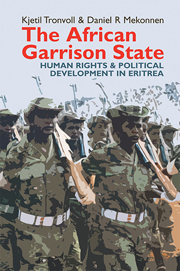Book contents
- Frontmatter
- Contents
- List of Acronyms and Abbreviations
- Preface
- Map 1 Provinces, Main Towns and Ethno-linguistic Groups of Eritrea
- 1 Introduction: The Eritrean Garrison State
- 2 Judicial Development in Independent Eritrea: Legal Pluralism and Political Containment
- 3 Rule of Law(lessness): The Special Court and the Judiciary
- 4 Democratic Curtailment: ‘Never Democracy, Always Control!’
- 5 Obliterating Civil Society: Denying Freedom of Organisation and Expression
- 6 The Eritrean Gulag Archipelago: Prison Conditions, Torture and Extrajudicial Killings
- 7 Everyday Life of Detention and Disappearances: Vulnerable Groups in a Population Under Siege
- 8 Minority Marginalisation: EPLF's Policies of ‘Cultural Superiority’
- 9 Diversity Diminished: Targeting the Kunama Minority Group
- 10 The Militarisation of Eritrean Society: Omnipresent and Never-Ending Military Service
- 11 Eritrea: Towards a Transition?
- Bibliography
- Index
7 - Everyday Life of Detention and Disappearances: Vulnerable Groups in a Population Under Siege
Published online by Cambridge University Press: 05 October 2014
- Frontmatter
- Contents
- List of Acronyms and Abbreviations
- Preface
- Map 1 Provinces, Main Towns and Ethno-linguistic Groups of Eritrea
- 1 Introduction: The Eritrean Garrison State
- 2 Judicial Development in Independent Eritrea: Legal Pluralism and Political Containment
- 3 Rule of Law(lessness): The Special Court and the Judiciary
- 4 Democratic Curtailment: ‘Never Democracy, Always Control!’
- 5 Obliterating Civil Society: Denying Freedom of Organisation and Expression
- 6 The Eritrean Gulag Archipelago: Prison Conditions, Torture and Extrajudicial Killings
- 7 Everyday Life of Detention and Disappearances: Vulnerable Groups in a Population Under Siege
- 8 Minority Marginalisation: EPLF's Policies of ‘Cultural Superiority’
- 9 Diversity Diminished: Targeting the Kunama Minority Group
- 10 The Militarisation of Eritrean Society: Omnipresent and Never-Ending Military Service
- 11 Eritrea: Towards a Transition?
- Bibliography
- Index
Summary
INTRODUCTION
Memories of the detention and disappearances of loved ones by the brutal Ethiopian military dictatorship during the war of liberation still linger among the people of Eritrea. However, today those memories are overshadowed by the current brutal reality, that their own government is even more ruthlessly vicious than their former enemy.
Despite the fact that there is a fairly adequate formal legal framework for the protection of basic human rights in the country (see Chapter 2), widespread and systematic violations on a massive scale occur on a daily basis in Eritrea. Eritrean and international laws prohibit arbitrary arrest and detention, yet it remains a serious and pervasive problem in the country (USSD 2011: 5). No one knows how many individuals – men and women, old and young – are kept in detention or under arrest in Eritrea today, but estimates suggest 10,000 (UN Special Rapporteur on Eritrea, 2013). Today, anyone in Eritrea is liable to arrest and detention, irrespective of their age, gender, religion or ethnicity. Any reason – or no reason at all – may be given for their arrest or detention.
WHO IS DETAINED AND WHY?
Old age or youth is not an excuse for avoiding detention. Reportedly, detainees of over 80 years of age and in poor health are held under rudimentary conditions in prisons. For instance, 82-year old Hassen Sheik Feres was arrested by the security forces in May 2007, without any charges. He is held in high esteem as a veteran liberation fighter for Eritrean independence in the 1960s.
- Type
- Chapter
- Information
- The African Garrison StateHuman Rights and Political Development in Eritrea, pp. 107 - 127Publisher: Boydell & BrewerPrint publication year: 2014

